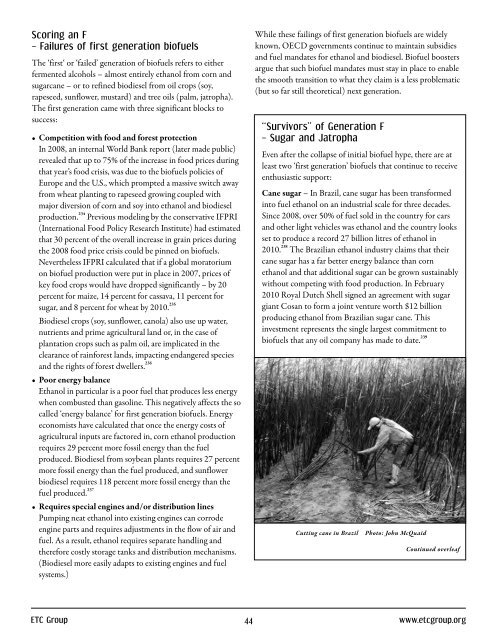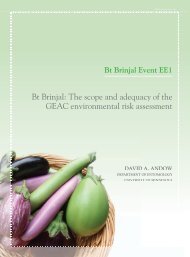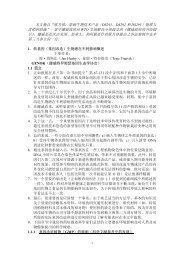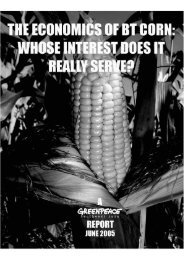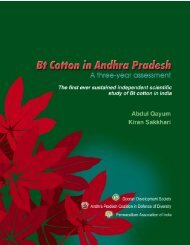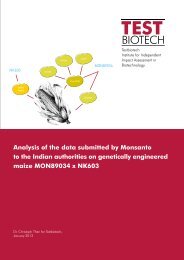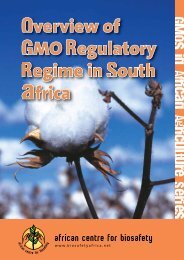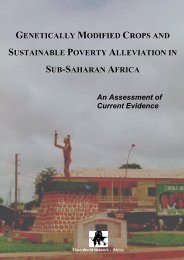English - pdf - 2145 Kb - Biosafety Information Centre
English - pdf - 2145 Kb - Biosafety Information Centre
English - pdf - 2145 Kb - Biosafety Information Centre
- No tags were found...
Create successful ePaper yourself
Turn your PDF publications into a flip-book with our unique Google optimized e-Paper software.
Scoring an F– Failures of first generation biofuelsThe ‘first‘ or ‘failed’ generation of biofuels refers to eitherfermented alcohols – almost entirely ethanol from corn andsugarcane – or to refined biodiesel from oil crops (soy,rapeseed, sunflower, mustard) and tree oils (palm, jatropha).The first generation came with three significant blocks tosuccess:• Competition with food and forest protectionIn 2008, an internal World Bank report (later made public)revealed that up to 75% of the increase in food prices duringthat year’s food crisis, was due to the biofuels policies ofEurope and the U.S., which prompted a massive switch awayfrom wheat planting to rapeseed growing coupled withmajor diversion of corn and soy into ethanol and biodieselproduction. 234 Previous modeling by the conservative IFPRI(International Food Policy Research Institute) had estimatedthat 30 percent of the overall increase in grain prices duringthe 2008 food price crisis could be pinned on biofuels.Nevertheless IFPRI calculated that if a global moratoriumon biofuel production were put in place in 2007, prices ofkey food crops would have dropped significantly – by 20percent for maize, 14 percent for cassava, 11 percent forsugar, and 8 percent for wheat by 2010. 235Biodiesel crops (soy, sunflower, canola) also use up water,nutrients and prime agricultural land or, in the case ofplantation crops such as palm oil, are implicated in theclearance of rainforest lands, impacting endangered speciesand the rights of forest dwellers. 236• Poor energy balanceEthanol in particular is a poor fuel that produces less energywhen combusted than gasoline. This negatively affects the socalled ‘energy balance’ for first generation biofuels. Energyeconomists have calculated that once the energy costs ofagricultural inputs are factored in, corn ethanol productionrequires 29 percent more fossil energy than the fuelproduced. Biodiesel from soybean plants requires 27 percentmore fossil energy than the fuel produced, and sunflowerbiodiesel requires 118 percent more fossil energy than thefuel produced. 237• Requires special engines and/or distribution linesPumping neat ethanol into existing engines can corrodeengine parts and requires adjustments in the flow of air andfuel. As a result, ethanol requires separate handling andtherefore costly storage tanks and distribution mechanisms.(Biodiesel more easily adapts to existing engines and fuelsystems.)While these failings of first generation biofuels are widelyknown, OECD governments continue to maintain subsidiesand fuel mandates for ethanol and biodiesel. Biofuel boostersargue that such biofuel mandates must stay in place to enablethe smooth transition to what they claim is a less problematic(but so far still theoretical) next generation.“Survivors” of Generation F– Sugar and JatrophaEven after the collapse of initial biofuel hype, there are atleast two ‘first generation’ biofuels that continue to receiveenthusiastic support:Cane sugar – In Brazil, cane sugar has been transformedinto fuel ethanol on an industrial scale for three decades.Since 2008, over 50% of fuel sold in the country for carsand other light vehicles was ethanol and the country looksset to produce a record 27 billion litres of ethanol in2010. 238 The Brazilian ethanol industry claims that theircane sugar has a far better energy balance than cornethanol and that additional sugar can be grown sustainablywithout competing with food production. In February2010 Royal Dutch Shell signed an agreement with sugargiant Cosan to form a joint venture worth $12 billionproducing ethanol from Brazilian sugar cane. Thisinvestment represents the single largest commitment tobiofuels that any oil company has made to date. 239Cutting cane in BrazilPhoto: John McQuaidContinued overleafETC Group 44 www.etcgroup.org


